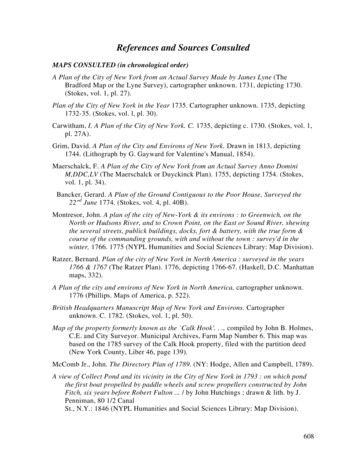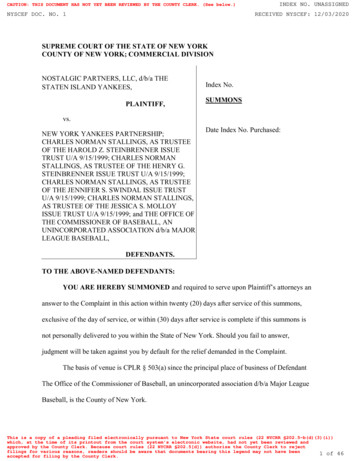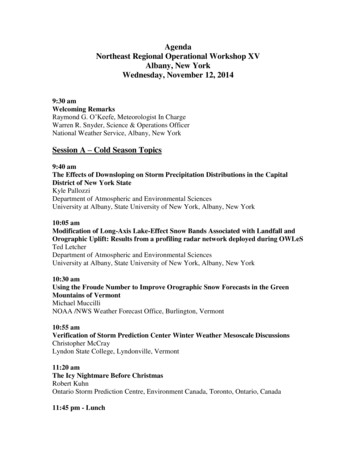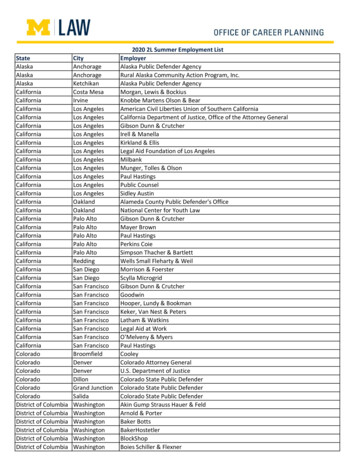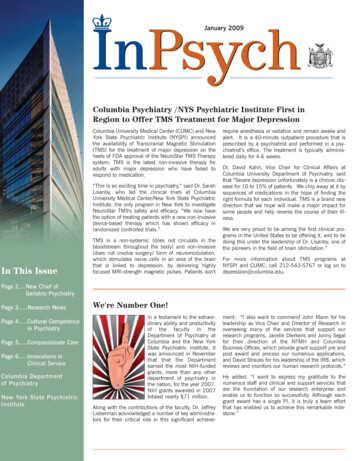
Transcription
InPsychJanuary 2009Columbia Psychiatry /NYS Psychiatric Institute First inRegion to Offer TMS Treatment for Major DepressionColumbia University Medical Center (CUMC) and NewYork State Psychiatric Institute (NYSPI) announcedthe availability of Transcranial Magnetic Stimulation(TMS) for the treatment of major depression on theheels of FDA approval of the NeuroStar TMS Therapysystem. TMS is the latest non-invasive therapy foradults with major depression who have failed torespond to medication.“This is an exciting time in psychiatry,” said Dr. SarahLisanby, who led the clinical trials at ColumbiaUniversity Medical Center/New York State PsychiatricInstitute, the only program in New York to investigateNeuroStar TMS's safety and efficacy. “We now havethe option of treating patients with a new non-invasivedevice-based therapy which has shown efficacy inrandomized controlled trials.”In This IssueTMS is a non-systemic (does not circulate in thebloodstream throughout the body) and non-invasive(does not involve surgery) form of neuromodulation,which stimulates nerve cells in an area of the brainthat is linked to depression, by delivering highlyfocused MRI-strength magnetic pulses. Patients don'trequire anesthesia or sedation and remain awake andalert. It is a 40-minute outpatient procedure that isprescribed by a psychiatrist and performed in a psychiatrist’s office. The treatment is typically administered daily for 4-6 weeks.Dr. David Kahn, Vice Chair for Clinical Affairs atColumbia University Department of Psychiatry, saidthat “Severe depression unfortunately is a chronic disease for 10 to 15% of patients. We chip away at it bysequences of medications in the hope of finding theright formula for each individual. TMS is a brand newdirection that we hope will make a major impact forsome people and help reverse the course of their illness.We are very proud to be among the first clinical programs in the United States to be offering it, and to bedoing this under the leadership of Dr. Lisanby, one ofthe pioneers in the field of brain stimulation.”For more information about TMS programs atNYSPI and CUMC, call 212-543-5767 or log on todepression@columbia.edu.Page 2.New Chief ofGeriatric PsychiatryPage 3.Research NewsPage 4.Cultural Competencein PsychiatryPage 5.Compassionate CarePage 6.Innovations inClinical ServiceColumbia Departmentof PsychiatryNew York State PsychiatricInstituteWe're Number One!In a testament to the extraordinary ability and productivityof the faculty in theDepartment of Psychiatry atColumbia and the New YorkState Psychiatric Institute, itwas announced in Novemberthat that the Departmentearned the most NIH-fundedgrants, more than any otherdepartment of psychiatry inthe nation, for the year 2007.NIH grants awarded in 2007totaled nearly 71 million.Along with the contributions of the faculty, Dr. JeffreyLieberman acknowledged a number of key administrators for their critical role in this significant achieve-ment: “I also want to commend John Mann for hisleadership as Vice Chair and Director of Research inoverseeing many of the services that support ourresearch programs, Janelle Dierkens and Jonny Segalfor their direction of the RFMH and ColumbiaBusiness Offices, which provide grant support pre andpost award and process our numerous applications,and David Strauss for his leadership of the IRB, whichreviews and monitors our human research protocols.”He added: “I want to express my gratitude to thenumerous staff and clinical and support services thatare the foundation of our research enterprise andenable us to function so successfully. Although eachgrant award has a single PI, it is truly a team effortthat has enabled us to achieve this remarkable milestone.”
Promotions&AppointmentsDavangere DevanandAfter serving as Acting Director since December 2006,Dr. Davangere Devanand, Professor of ClinicalPsychiatry and Neurology at Columbia UniversityCollege of Physicians and Surgeons, was appointedDirector of the Division of Geriatric Psychiatry in theDepartment of Psychiatry in August 2008.In his new role, Dr. Devanand will consolidate and unify current operations within the Division as well as expand its research, training and clinical activities in order to make it one of the best programs in geriatricpsychiatry in the country. In addition, he will oversee the recruitmentand development of faculty to expand research, enhance training anddevelop clinical services in geriatric psychiatry for New York StatePsychiatric Institute (NYSPI), Columbia University Medical Center andNew York Presbyterian Hospital.A graduate of medical school at Christian Medical College, Vellore, inIndia, Dr. Devanand trained in psychiatry at the National Institute ofMental Health and Neurosciences, Bangalore, India. He completed psy-chiatry residency training at S.U.N.Y. Upstate Medical Center, Syracuse,and Yale University School of Medicine. He then did a clinical researchfellowship at Columbia University, and has been a member of the faculty at Columbia University since 1987.Currently, Dr. Devanand is Co-Director of the Memory Disorders Centerand Co-Director of the Late Life Depression Clinic at NYSPI. Hisresearch studies involve Alzheimer's disease, geriatric depression andelectroconvulsive therapy. His research has helped define the clinicalfeatures and treatment response in elderly patients with chronic mild tomoderate depression, or dysthymic disorder and the development ofdiagnostic markers of early stages of Alzheimer's disease. His researchhas also focused on the interface between depression and cognitiveimpairment, and the treatment of behavioral complications inAlzheimer's disease. He has been principal investigator on severalresearch grants from the National Institute of Aging and the NationalInstitute of Mental Health. He has also been funded by the Alzheimer'sAssociation, NARSAD, and the Dana Foundation. He has publishedover 180 research papers and articles, and is the author of three books.Message from the Chairman and Director: Coping with the Financial CrisisTo paraphrase Dickens, 2008 was “the bestand worst of times.” In the past year ColumbiaPsychiatry/Psychiatric Institute was ranked #1in the country by the all-important measure ofNIH grants received. Our training programsunderwent significant improvements and thepool of applicants seeking admission is nowbigger and better than ever. Our clinical services continued to expand and improve in theirvariety and quality. We began the pursuit of new initiatives in genetics, women's mental health, geriatric psychiatry and autism. Andthen the financial crisis hit and the bottom fell out of the economy.These developments have shaken the world and have had a chillingeffect on academic medical institutions. Unfortunately ours isno exception.Reduced tax revenues and the need for a stimulus package will limitthe ability of the federal government to allocate funds to the NIH.Foundations that fund research have seen their endowments declineor be completely wiped out. As a result, some of our faculty members have already been informed that grants will not be funded orcontinued. Consequently, their laboratories, which have taken yearsto build, will need to lay off personnel or even close. In addition, thesight of accomplished researchers struggling to maintain their labsmay discourage students and trainees from pursuing careers in medical research.The financial crisis has also substantially reduced tax revenues toNY State. This has prompted the Governor to impose a hiring and2spending freeze on state agencies including the Office of MentalHealth and to propose cuts in Medicaid reimbursement. The formerprevents us from filling positions at Psychiatric Institute and the latter will reduce the revenues of NYPH. This comes at the same timethat we will experience an increased clinical burden as greater numbers of people seek mental health care, many after losing their jobsand health insurance.In recent years, medical schools and hospitals have increasinglyrelied upon philanthropy to provide support for research and trainingactivities as health care cost containment has reduced clinical revenues; however, philanthropy has declined dramatically.Thus, the consequences of this economic crisis will impede theprogress of medical research, increase the rates and severity of illness in our population and place greater burdens on our health caresystem in the face of reduced reimbursement.Despite the economic gloom, I am confident that ColumbiaPsychiatry and PI will meet these challenges successfully and I amoptimistic about our future. However, the financial crisis will deterour progress and make it more difficult to achieve our goals in thenear term. Now more than ever we need the support of our alumni,friends and supporters to avert these threats to our outstandingresearch, educational and clinical programs.
ResearchNewsResearch Reported in the NewsAnne Marie Albano “Cognitive Behavioral Therapy, Sertraline, or aCombination in Childhood Anxiety” (New England Journal of Medicine)While anxiety in children and adolescents is common, few studies havetested the relative effectiveness of first-line treatments cognitive behavioral therapy (CBT) and the selective serotonin-reuptake inhibitor sertraline (Zoloft). Now parents as well as physicians have definitive answers.In a highly-anticipated paper released in October 2008, the researchersAnne Marie Albano and Moira Rynn of Columbia Psychiatry/New YorkState Psychiatric Institute - and their colleagues at five other sitesnationwide - found the combined therapy was more effective in treatinganxiety in children than either treatment alone. Results also showed thatthe treatments were safe.A total of 488 children, ages 7 years to 17 years, were randomlyassigned to one of four treatment options for a 12-week period: CBT, a specific type of therapy that, for this study, taught childrenabout anxiety and helped them face and master their fears by guidingthem through structured tasks; the antidepressant sertraline; CBT combined with sertraline; pill placebo (sugar pill).Among those children in combination treatment, 81 percent improved.Sixty percent in the CBT-only group improved and 55 percent in the sertraline-only group improved. Among those on placebo, 24 percentimproved. A second phase of the study will monitor the children for anadditional six months. The children, recruited from six regionally dispersed sites throughout the United States, all had moderate to severeseparation anxiety disorder, generalized anxiety disorder or social phobia. Many also had coexisting disorders, including other anxiety disorders, attention deficit hyperactivity disorder, and behavior problems.The latest findings, published in the New England Journal of Medicine, arepart of the larger The Child/Adolescent Anxiety Multimodal Study (CAMS),which is sponsored by the National Institutes of Mental Health (NIMH).Yaakov Stern “Survival in Alzheimer Disease: A multiethnic, population-based study of incident cases”(Neurology)Using Alzheimer’s disease cases from the WashingtonHeights Inwood Columbia Aging Project (WHICAP),Yaakov Stern and colleagues identified diabetes andhypertension as contributing factors to decreased survival among individuals with Alzheimer’s. The provocative new findings attracted worldwide attention and were featured inreports by Reuters and the US News & World Report.Researchers followed 323 individuals, who developed Alzheimer's during the study, for an average of 4 years and up to about 13 years. Theresults showed that for individuals who had co-occurring Alzheimer'sdisease and hypertension, the mortality risk was more than two and halftimes greater when compared to patients who only had Alzheimer's disease. For patients with co-occurring Alzheimer's and diabetes, the mortality risk was twice as high when compared to Alzheimer's patientswithout diabetes.The research also yielded interesting data about the impact of race/ethnicity on survival rates among people with Alzheimer's disease: nonHispanic whites in the sample had the highest mortality rate with anaverage length of survival post-diagnosis of four years compared to eightyears among Hispanics and five years among African-Americans.Study participants were culled from the WHICAP's multi-ethnic cohort of4300 Medicare recipients in upper Manhattan. Assessments were doneat baseline and at subsequent follow-up visits.The study was published in the November issue of the journal Neurology.NARSAD Symposium A SuccessAnissa Abi-DarghamIt was a beautiful sunny Sunday afternoon, but people turned out in droves for NARSAD's Healthy Minds Across America campaign onSeptember 14, 2008 at New York State Psychiatric Institute/Columbia University Medical Center. Researchers, consumers and family members were among those who showed up to listen to some of the most noteworthy scientists studying schizophrenia today: Drs. Eric Kandel,Nobel Laureate (“A New Perspective on Schizophrenia”), Anissa Abi-Dargham, Director, Clinical & Imaging Research (“A Decade of ImagingDopamine in Schizophrenia: What We Have Learned”) and Jeffrey Lieberman, Chairman and Director Columbia University Dept. of Psychiatry& NYS Psychiatric Institute (“Treatments for Brain Disorders: Prospects for Preventing and Recovering from Mental Illness”). Dr. Herbert Pardes,President and CEO of New York Presbyterian Hospital delivered the closing remarks.3
OtherNewsGrantNewsBringing Cultural Competence to Psychiatry New Grants:Healthcare disparity in our communities is nothing new, but its sting isparticularly painful for those who identify as Latino, African-American, oranother underserved ethnic minority and who live with a serious mentalillness. People with serious mental illness (SMI) have higher rates ofmorbidity and mortality, and they die, on average, 25-30 years youngerthan the general population. Sixty to seventy percent of this increase inmorbidity and mortality is due to “natural causes” which are treatablephysical illnesses and modifiable risk factors. For African-Americansand Latinos, who are more likely to suffer from diabetes and hypertension than their white peers, being diagnosed with a psychiatric illnesswill increase their risk of adverse outcomes even further.“Providing the best possible help to the seriously mentally ill in underserved ethnic and linguistic communities means first addressing treatment within a framework that is sensitive to the cultural and linguisticcharacteristics that define these groups,” said Dr. Roberto LewisFernández, Director of the Center of Excellence for Cultural Competenceat the New York State Psychiatric Institute.Established earlier this year, the Center is embarking on a five-phasecommunity outreach project in Northern Manhattan that will developculturally competent, person-centered best practices for delivering physical health care to patients with serious mental illness. This project isbeing conducted in collaboration with diverse community stakeholders,including consumers, family members, providers, representatives offaith-based organizations and community residents. The five phases ofthe project consist of the following:Phase One - Program-Needs Assessment: The Center will carry out aninitial evaluation of six mental health programs across NorthernManhattan. One of the goals of this phase is to start to develop alternative models for integrated physical and mental health services.Phase Two - Cultural Competence: The Center will collaborate withcommunity members, programs and clinics on a plan to choose interventions to enhance culturally competent management of physicalhealth problems in a way that addresses patients' needs.Phase Three - Evaluation: After carrying out a thorough baseline assessment of each clinic, the Center will assess the cultural competence ofexisting services, detection/ management of physical health problems,patient engagement, patients' management of lifestyle choices thataffect health - such as diet, exercise, and smoking - and patient outcomes.Phase Four - Intervention: The Center’s team will assist each mentalhealth clinic with implementing the chosen intervention.Phase Five - Post-Intervention: The research team will assess the intervention's impact and sustainability in terms of physical health outcomes,financial feasibility, and enhancement of culturally and linguisticallyappropriate services.In Washington Heights and Inwood, about 72% of the community is ofLatino origin, while in Harlem, 67% is African American with 20%Latino. “These demographics have created challenges in understandinghow culture, race, language, religion and ethnicity impact patient careand treatment,” said Dr. Lewis-Fernández. Ultimately, the Center's goalis to work with each individual and his/her provider(s) to ensure that aculturally-sensitive approach is incorporated in the physical and mentalhealth treatment plan.For now the five-phase outreach project will concentrate efforts in thecommunities surrounding the Psychiatric Institute. Eventually the workwill expand into a statewide initiative.4National Institute on Alcohol Abuse and AlcoholismJonathan Morganstern: NIH support for conference andscientific meetingsMark Underwood: Dorsal raphe nucleus serotonin neurons inalcoholism (R-01)National Institute of Biomedical Imaging and BioengineeringDongrong Xu: An integrated package for the processing and analysisof diffusion tensor imagingNational Institute on Drug AbuseNicole Barbarich-Marsteller: Adolescent vulnerability topsychostimulants: effects of sex and food restriction (K-Award)Margaret Haney: Modafinil and DRD4 genotype in a humanlaboratory model of cocaine relapse (R01)Frances Levin: (1) Research fellowship in substance abuse disorder;(2) Multi-site controlled trial of cocaine vaccine (6 of 6) ColumbiaUniversity siteNed Nunes: Treatment Studies Using Depot Naltrexone (4/6)Columbia Protocol Treatment Site (R01)National Institute of HealthMichael Myers: Developmental Neuroscience and BehaviorNational Institute of Mental HealthAllegra Broft: Bulimia nervosa and dopamine: a link to addictions?Alan Brown: (1) Epidemiology of prenatal factors and adultpsychopathology (K-Award); (2) Prenatal factors and risk ofschizophrenia in a Finnish national birth Cohort (R01)Jimmy Choi: Motivation and learning in schizophreniaMichael Drew: Analyzing the role of adult hippocampalneurogenesis in contextual fear memory (K-Award)Joshua Gordon: Neural mechanisms of increased anxiety inserotonin 1A receptor-deficient miceJonathan Javitch: Structure and function of dopamine receptors (R01)Mark Opler: Paternal germ line effects and the risk of schizophreniain offspring (K-Award)Sapana Patel: Patient-centered care for underserved minorities inprimary careAnthony Pinto: Phenomenology of obsessive compulsive personalitydisorder (K-Award)Gorazd B. Rosoklija: Morphology of hippocampal neurons in depressionBarbara Stanley: Treating suicidal behavior and self mutilation inBPD (R01)National Institute of Neurological Disorders and StrokeKathleen Friel: Mechanisms of cerebral palsy recovery induced bybalancing motor cortex activityNew York State Health FoundationIlana Nossel: Critical time intervention for frequent users of thecomprehensive psychiatric emergency programsTibotech REACH InitiativeJoanne Mantell: Beliefs about male circumcision and HIV preventionat primary care clinics in Kwazulu-Natal, South Africa
Awards&RecognitionsBeginning November, 2008, Kelli Harding was appointed to a two yearterm on the Association of American Medical Colleges board of directors.Jonathan Amiel was selected as one of two resident representatives bythe American Association of Directors of Psychiatric Residency Trainingto the American Association of Medical Colleges Organization ofResident Representatives. This appointment is for a three-year term.The committee recognizes Dr. Amiel's leadership potential in academicmedicine and his interest in residency education and leadership issues.Stan Arkow is one of four physicians to earn NYPresbyterian's Physicians of the Year award, which wasformally presented in October, 2008.Katherine Elkington is the recipient of the Dr. Joseph E. and LillianPisetsky Award for clinical research on serious adult mental disorders.Dr. Elkington's project - "The Reliability and Validity of the Mental IllnessStigma-Sexual Health Questionnaire" - was chosen from among 17impressive applications.Katherine Keyes is the recipient of two nationalawards: One was the Enoch Gordis award for outstanding student research from the Research Society onAlcoholism on the role of binge drinking in alcoholdependence. The other was the Society forEpidemiologic Research 2008 Lilienfeld Student Prizeon methods to investigate age-period-cohort effects inaggregated data collected over time.The Wilfred Hulse Award from the NY Council on Child and AdolescentPsychiatry was presented to Owen Lewis for outstanding contributionsto child and adolescent psychiatry.Kelly Posner was invited to give remarks on June 12during a day-long European Union High-LevelConference, “Together for Mental Health andWellbeing.”She spoke during the session on“Depression and Suicide - Tackling the Public HealthChallenge.”Irving Institute for Clinical and Translational Research awarded ScottSchobel and Tiziano Colibazzi an Imaging Pilot Award. It will supportdirect brain imaging work in the Center of Prevention and Evaluation(COPE), Columbia's prodromal psychosis research clinic. Drs. Schobeland Colibazzi are piloting combined longitudinal high-resolution structural and functional fMRI of the hippocampus in youths at risk for psychosisto understand the relation of hippocampal function to structure throughthe transition to psychosis.Mary Sciutto is one of five Columbia physicians (and the only psychiatrist) named as an Advisory Dean to the College of Physicians andSurgeons. In this role, she will be working closely with first through fourthyear medical students as a mentor and academic and career advisor.In May 2008, the HIV Center’s Theo Sandfort’s bodyof scientific work was honored by the Society for theScientific Study of Sexuality, which presented him withits "John Money Award," named for a pioneering scholar of sexuality.David Sulzer and his collaborator won the McKnight Award inNeuroscience for Technological Innovations. Each of them will receive 100,000.Myrna Weissman has been named the 2009 Thomas William SalmonMedalist by the Board of Trustees of the New York Academy of Medicine.The Thomas William Salmon Medal is given to promote research and tohonor notable contributions to the advancement of psychiatry, mentalhygiene and related subjects. The medal, first awarded in 1942, is givenin memory of Thomas W. Salmon (1876-1927), a gifted and belovedphysician whose contribution to the cause of the mentally ill and distressed was one of the most notable and fruitful of his generation. Inaddition, Dr. Weissman was named one of the ten epidemiologists in theUnited States who has had an impact on public policy and public healthby the Dana Alliance for Brain Initiatives. A summary of her work indepression will be featured in a special issue of the Annals ofEpidemiology titled “Triumphs in Epidemiology.”CompassionateCareand egalitarian. Leading by example, his entire staff reflectedthat sensibility.Dear Dr. Lieberman,I am writing in reference to my father a retired professor ofColumbia University. My dad trained at P&S many years ago andwas a venerated physician throughout the course of his years of service. My dad suffered a psychotic episode at home where I also residealong with my spouse and children. We are his primary caregivers Drs. Amsel and Benaur did an excellent job in tandem with Dr.Lucien Cote to arrive at a cocktail that would help to stabilize myfather's overall behavior. The fact that my father was given thebenefit of time so that the medical experts could work slowly andmethodically made all the difference in achieving their desired result.Sonia Gilbert was also a great resource for facilitating my father’s[discharge].Dad was admitted to 9 Garden North. From the moment he wasreleased to the care of Dr. [Stan] Arkow, Dr. [Larry] Amsel, Dr.[Marina] Benaur and his team of caregivers it was clear that myfather was in a safe and nurturing environment. I greatly appreciated the deferential and respectful way that he was treated by all concerned. Dr. Arkow impressed me as a “mensch” who is both accessibleDad had more socialization in the time he was on 9 Garden Northcompared to the three years we have cared for him at home I’mso grateful that he was able to blossom in such a special garden!.I am truly grateful that my dad was the lucky beneficiary ofsuch wonderful care, professionalism and the extra bonus of tenderloving care.5
InnovationsInClinicalServicesPsychiatric Care Across the Reproductive Life CycleWhere can women go for help when post-partum depression strikes? Ifthey live in New York City, women can call upon the expertise of theWomen's Program in Psychiatry at Columbia. The program was established to address the mental health needs of women across the reproductive life cycle.Mood disorders are twice as prevalent in women compared to menparticularly in the childbearing years. This vulnerability suggests a needfor specialized services in order to address mood, anxiety and otherpsychiatric disorders associated with the menstrual cycle, childbearingand menopause.Renowned post-partum expert Dr. Margaret Spinelli developed a teachingprogram to instruct residents and other psychiatrists about diagnosingand treating pregnant women who presented with psychiatric disorders.The teaching program evolved into a full-fledged treatment program in2006. Directed by Dr. Spinelli, the Program provides expert perinataland reproductive psychiatric evaluations. The Women's Program is locatedin the Intensive Outpatient Department (IOP) at New York PresbyterianHospital (NYPH). IOP director Dr. Mary Sciutto is passionate about thesupport patients receive: “First and foremost, we provide women, particularly those in crisis, with short-term, rapidly accessible treatment.”Services include: Comprehensive evaluation Obstetrics/gynecology and neurological consultation Medication consultation during pregnancy and breastfeeding Crisis intervention with referral for inpatient treatment at New YorkPresbyterian when indicated Medication treatmentA multidisciplinary team of expert clinicians, including reproductive andperinatal psychiatrists Drs. Elizabeth Fitelson, Eileen Kavanagh andKristen Leight, provide help to women who need treatment for not onlypost-partum depression, which affects between 15 to 20% of women,but also depression during pregnancy that occurs in more than one in10 women. Prenatal psychopharmacology consultations are provided inaddition to treatment for premenstrual and perimenopausal mood disorders.With easy access to some of the best psychiatry researchers at ColumbiaUniversity Medical Center/New York State Psychiatric Institute and theclinical expertise of New York Presbyterian Hospital, patients will enjoythe added benefit of breakthrough science in reproductive psychiatry.One such advantage is the proximity to non-traditional techniques fortreating depression in pregnant women. Non-medication treatments likelight therapy and interpersonal psychotherapy are being explored inresearch studies in which patients can enroll.“The Women’s Program fills a major public health gap” says Dr.Spinelli.”It also provides our residents with unique educational, clinicaland research experience. The academic arm of the program alsoprovides the potential for a clinical and research fellowship in reproductivepsychiatry. Weekly psychopharmacology rounds are held everyWednesday at 3pm where faculty, residents and medical students areinvited to present their cases.”The Women in Psychiatry program currently has a liaison psychiatrist tothe Department of Obstetrics and Gynecology, a great bonus for patientsin the program.Affordable payment options-including insurance, self-pay and slidingscale-are also available. There is a 24-hour crisis hotline and callers canspeak to a board-certified attending who will triage each case. Thatnumber is 212-305-6001. Support groups Psychotherapy Family education and supportInPsychThe New York State Psychiatric Institute1051 Riverside DriveNew York, NY 10032InPsych Editorial Offices: 1051 Riverside Drive New York, NY 10032Dacia Morris, Public Information Officer (212) 543-5421www.columbiapsychiatry.org6
University Medical Center/New York State Psychiatric Institute, the only program in New York to investigate NeuroStar TMS's safety and efficacy. "We now have the option of treating patients with a new non-invasive device-based therapy which has shown efficacy in randomized controlled trials." TMS is a non-systemic (does not circulate in the



